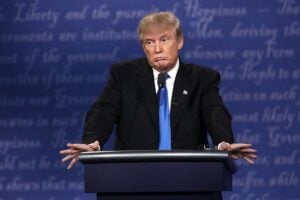 Donald Trump’s lawyers have got more spaghetti than a New Jersey creek, and they’re throwing it all at the wall this week. Even as they rested their case in the E. Jean Carroll battery and defamation trial — probably! — they marched into the Southern District of New York and demanded that the state prosecution by Manhattan District Attorney Alvin Bragg be removed to federal court.
Donald Trump’s lawyers have got more spaghetti than a New Jersey creek, and they’re throwing it all at the wall this week. Even as they rested their case in the E. Jean Carroll battery and defamation trial — probably! — they marched into the Southern District of New York and demanded that the state prosecution by Manhattan District Attorney Alvin Bragg be removed to federal court.
The state prosecution involves invoices and checks to reimburse former attorney Michael Cohen for the hush money payment to Stormy Daniels. Trump is facing 34 counts of first degree falsification under NY PL § 175.10, a felony because the defendant’s “intent to defraud includes an intent to commit another crime or to aid or conceal the commission thereof.” When asked what the other crime was, Bragg made vague references to violations of “New York state election law, ” which makes it a “crime to conspire to promote a candidate by unlawful means,” as well as to violations of federal election laws. Multiple commentators have suggested that, because federal election law preempts state law, Bragg cannot rely on violations of federal campaign finance statutes as the other crime that elevates the charge from a misdemeanor to a felony. And indeed the notice of removal relies heavily on the preemption claim.
Additionally, Trump’s lawyers, Susan Necheles, Todde Blanche, and Joseph Tacopina, argue that Trump was acting within the scope of his official duties, or at least adjacent to them, when he paid Cohen off.

Chrometa: Turning Time Into Billable Value For Modern Lawyers
Adoption of Chrometa represents more than a technological upgrade; it reflects a professional philosophy that values accuracy, transparency, and efficiency.
First they claim that Cohen was in fact doing legal work to arrange Trump’s affairs to allay “public expressions of concern about potential conflicts of interest, corruption, and possible constitutional violations due to President Trump’s extensive business interests and wealth,” not simply being reimbursed for the payoff. Cohen has consistently denied this; Trump’s lawyer Rudy Giuliani contradicted it on national television; and it is belied by the equal payments, roughly doubling Cohen’s actual cash outlay to cover his tax liability. But having made that claim, they then argue that “President Trump’s decision to retain Michael Cohen to act as his personal lawyer arose out of his duties as President and therefore gives rise to a federal defense to the charges in this case.”
Second they make a bizarre argument that federal removal is appropriate because DA Bragg is biased:
Finally, because the instant indictment is politically motivated and was brought because a local politician—here D.A. Bragg—disfavored President’s Trump’s acts and policies as President of the United States, federal courts have so-called “protective jurisdiction” over this case. Although the Supreme Court has never definitively decided whether §1442 provides federal protective jurisdiction in cases of state hostility to the federal officer, at least some Justices has said it does.
In support of this proposition, they cite the Supreme Court’s decision in Trump v. Vance, in which the Court acknowledged “the possibility that state prosecutors may have political motivations,” but still ordered Trump to comply with subpoenas from Bragg’s predecessor Cyrus Vance Jr.

Introducing LexisNexis Protégé™ in Lex Machina®
Lex Machina harnesses generative AI capabilities to revolutionize the way legal professionals interact with data to improve bottom line for their business.
The case was assigned to Judge Ronnie Abrams, an Obama appointee whose husband Greg Andres, now at Davis Polk, was part of Special Counsel Robert Mueller’s team. During the pendency of that investigation, she recused from two civil suits against Trump, and she’s done the same here. Considering Trump’s social media posts attacking New York Supreme Court Justice Juan Merchan, who is presiding over the state prosecution, that’s probably the right move. Judge Alvin Hellerstein will hear this instead.
In any event, litigation over removal does not immediately halt the state prosecution, so the cases will proceed in parallel for the foreseeable future, meaning that Trump is one step closer to his goal of being in all the courts at once.
People of The State of New York v. Trump [Docket via Court Listener]
Liz Dye lives in Baltimore where she writes about law and politics and appears on the Opening Arguments podcast.